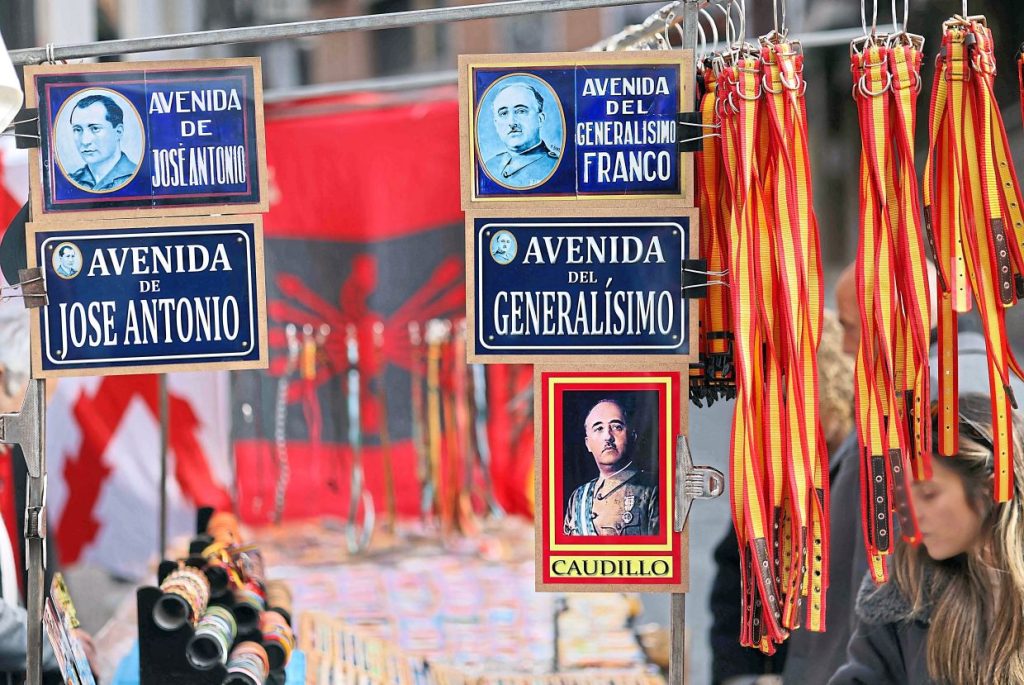Listen to the article
Spain’s Franco-Era Myths Challenged as Social Media Distorts Dictator’s Legacy
Fifty years after the death of Francisco Franco, social media platforms are awash with misleading claims that paint the Spanish dictator’s authoritarian rule in a favorable light. Experts warn that this wave of disinformation exploits historical ignorance to create nostalgic narratives about the 1939-1975 dictatorship.
“There is little knowledge of our history,” explains Jordi Rodriguez Virgili, professor in political communication at the University of Navarre. This historical gap, combined with the emotionally charged and polarizing nature of Franco’s legacy, creates fertile ground for misinformation to flourish.
The viral phrase “Life was better under Franco” has gained traction online, supported by exaggerated or distorted claims about the dictator’s achievements in infrastructure, social welfare, and housing. However, historical facts paint a more nuanced picture.
Many Spaniards incorrectly attribute Spain’s water infrastructure almost exclusively to Franco. Rodriguez Virgili describes this as “a collective myth about which there is huge ignorance.” While Franco did oversee dam construction, a comprehensive irrigation and reservoir plan existed in the early 20th century, well before his rise to power. Miguel Primo de Rivera, another dictator who ruled from 1923 to 1930, established water management bodies that remain operational today.
Many of Franco’s infrastructure projects actually continued or revived initiatives started during the Second Republic, the democratic government he overthrew in a bloody civil war that claimed hundreds of thousands of lives. Historian Matilde Eiroa San Francisco notes that some of Franco’s dam projects flooded entire villages and relied heavily on political prisoners’ labor – a darker aspect rarely mentioned in social media posts.
Social security represents another area where Franco’s achievements are frequently overstated. Online posts claim Spain established a “solid social security system” in 1942 under Franco’s leadership. However, Daniel Perez del Prado, secretary-general of the Spanish Association of Labour Law and Social Security, points out that Spain’s social protection framework began taking shape as early as 1900.
Several key benefits predated Franco’s regime: a pension scheme established in 1919, mandatory maternity coverage introduced in 1923, and unemployment benefits implemented in 1931. Franco’s government mainly consolidated these existing measures under the unified “Social Security” banner in 1963.
Similarly, paid holidays were not Franco’s innovation. The Second Republic had already granted workers seven days of annual paid leave in 1931. Spaniards only secured the right to 21 days of annual leave in 1976 – after Franco’s death.
Housing policy has become another flashpoint in modern Spain’s political discourse, with some claiming Franco built four million government-supported homes while criticizing current Prime Minister Pedro Sanchez for achieving nothing comparable.
Alfonso Fernandez Carbajal, a professor in applied economics at the University of Oviedo, clarifies that Franco-era housing aid lacked the income thresholds common in modern support schemes. His research indicates that 3.4 million government-supported homes were built between 1943 and 1975, but only 735,400 – less than 22% – were designated for low-income residents.
In contrast, under Sanchez’s administration (2018-present), 66,723 homes have received “protected” status through the first quarter of 2025, according to official data. These protected homes feature government subsidies and price controls for rental or sale.
Fernandez Carbajal cautions against direct comparisons between Franco’s centralized dictatorship and Spain’s modern democratic system, where housing responsibilities are significantly decentralized among regional governments – a stark contrast to Franco’s absolute control.
As Spain grapples with its complex historical legacy, this wave of Franco-related disinformation highlights the critical importance of historical literacy and context in an era when simplified narratives can rapidly spread through social media.
Fact Checker
Verify the accuracy of this article using The Disinformation Commission analysis and real-time sources.




12 Comments
Fascinating how the ‘Life was better under Franco’ narrative has gained traction online despite the more complex historical realities. A good reminder to be wary of oversimplified or exaggerated claims on social media.
Exactly. Nuance and context are often lost in the rapid spread of information online. Fact-checking is crucial to avoid falling for misleading narratives, even around historical figures.
Interesting to see how social media can distort historical narratives. It’s crucial to rely on well-researched facts rather than emotionally charged claims when discussing complex political legacies like Franco’s rule in Spain.
Absolutely, historical revisionism can be a dangerous tool for spreading disinformation. Fact-checking and media literacy are so important to counter these misleading narratives.
The article raises important questions about how social media can distort our understanding of history. It’s a sobering example of the need for critical thinking and fact-checking, even when it comes to long-settled historical narratives.
Agreed. Emotionally-charged claims on social media can quickly take on a life of their own, making it all the more important to refer back to well-researched historical accounts. Vigilance against revisionism is essential.
This is a timely reminder of the dangers of historical revisionism enabled by social media. The proliferation of misleading claims about Franco’s rule highlights the need for robust, evidence-based discussions of complex political histories.
Absolutely. Maintaining a balanced, nuanced perspective is crucial when it comes to understanding the legacies of authoritarian regimes. Relying on credible sources is key to avoiding the pitfalls of online disinformation.
The article underscores the power of social media to distort historical legacies. It’s a sobering example of how digital platforms can become breeding grounds for disinformation, if users don’t approach content critically.
Agreed. Combating the spread of misinformation requires media literacy, fact-checking, and a willingness to look beyond emotionally-charged narratives online.
The article highlights how lack of historical knowledge combined with the power of social media can lead to the proliferation of misinformation. It’s a cautionary tale about the need for critical thinking when consuming online content.
Agreed. Verifying claims against credible sources is key to separating fact from fiction, especially when it comes to charged political topics like this.